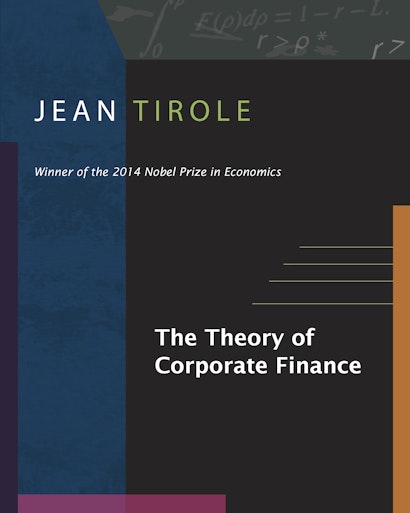The past twenty years have seen great theoretical and empirical advances in the field of corporate finance. Whereas once the subject addressed mainly the financing of corporations—equity, debt, and valuation—today it also embraces crucial issues of governance, liquidity, risk management, relationships between banks and corporations, and the macroeconomic impact of corporations. However, this progress has left in its wake a jumbled array of concepts and models that students are often hard put to make sense of.
Here, one of the world’s leading economists offers a lucid, unified, and comprehensive introduction to modern corporate finance theory. Jean Tirole builds his landmark book around a single model, using an incentive or contract theory approach. Filling a major gap in the field, The Theory of Corporate Finance is an indispensable resource for graduate and advanced undergraduate students as well as researchers of corporate finance, industrial organization, political economy, development, and macroeconomics.
Tirole conveys the organizing principles that structure the analysis of today’s key management and public policy issues, such as the reform of corporate governance and auditing; the role of private equity, financial markets, and takeovers; the efficient determination of leverage, dividends, liquidity, and risk management; and the design of managerial incentive packages. He weaves empirical studies into the book’s theoretical analysis. And he places the corporation in its broader environment, both microeconomic and macroeconomic, and examines the two-way interaction between the corporate environment and institutions.
Setting a new milestone in the field, The Theory of Corporate Finance will be the authoritative text for years to come.
Awards and Recognition
- Jean Tirole, Winner of the 2014 Nobel Prize in Economics
- Honorable Mention for the 2006 Award for Best Professional/Scholarly Book in Finance & Economics, Association of American Publishers
Jean Tirole, the winner of the 2014 Nobel Prize in Economics, is chairman of the Foundation Jean-Jacques Laffont at the Toulouse School of Economics, scientific director of Toulouse's Industrial Economics Institute, and annual visiting professor of economics at the Massachusetts Institute of Technology. His books include Financial Crises, Liquidity, and the International Monetary System (Princeton), The Theory of Industrial Organization, Game Theory (with Drew Fudenberg), and A Theory of Incentives in Procurement and Regulation (with Jean-Jacques Laffont).
"Magnificent. . . . This is far more than the mere textbook it purports to be; it has a plausible claim to be the first truly comprehensive overview of corporate finance by an economist."—The Economist
"Impeccably systematized. . . . Tirole's book will have a prominent place in my library, and I am sure that I shall have plenty of occasions to refer to its authority in the future. It fully deserves a 'buy' rating."—Rudi Bogni, Times Higher Education Supplement
"Tirole has provided the profession with its first comprehensive, advanced treatment of corporate finance theory. . . . It will have a major impact upon teaching and research in corporate finance."—David Webb, Economic Journal
"Using a single elementary model Tirole brings out with refreshing ease an unsuspected unity and simplicity in a field that might otherwise be perceived as dishearteningly fragmented and complex. This masterful book will be a formidable teaching tool at the graduate level and an essential reference for research in corporate finance."—Marco Pagano, Professor of Economics, University of Naples Federico II
"The field of corporate finance has developed rapidly and extensively in the last twenty years, but those who want to teach it face a barrier: the absence of a widely accepted textbook. Jean Tirole's book fills that gap. Applying his celebrated analytical and expositional skills, Tirole synthesizes and unifies the field in a clear and accessible manner, emphasizing particularly the connections between corporate finance and contract theory and the role of incentives and control in firms' financial decisions. The result is a book that will be an important resource for students and teachers alike."—Oliver Hart, Andrew E. Furer Professor of Economics, Harvard University
"With this book, Tirole has provided a comprehensive treatment of modern corporate finance theory in one place with one integrated framework. As a bonus, he also describes many of the important empirical results in corporate finance and how they relate to the theories. The book will be a valuable asset to students (and professors) of corporate finance."—Steve Kaplan, Neubauer Family Professor of Entrepreneurship and Finance, University of Chicago Graduate School of Business
"This is a remarkable book. Theoretical work in corporate finance over the past thirty or so years has yielded a bewildering array of individual models, yet Tirole manages to give a beautifully clear and unified treatment of the field. There is a real coherence both within and across the chapters, and one is in many places able to see the close connection between topics that are ordinarily treated as being distinct. The book will no doubt be the standard reference for researchers and students in corporate finance for many years to come."—Jeremy C. Stein, Harvard University
"Jean Tirole, one of the preeminent economists of his generation, has put together the first integrated treatise of modern corporate finance theory. He succeeds in unifying the dispersed theories on financial and ownership structure, building on his excellence in information economics and contract theory. The book should be required reading for any Ph.D. course in corporate finance."—Arnoud W. A. Boot, University of Amsterdam and Centre for Economic Policy Research
"The Theory of Corporate Finance is a towering achievement. Jean Tirole's vision is exhaustive, systematic and original. The major findings of the last two decades are recast in a unified framework, describing the multiple levels of contracting relationships created by firms' financial decisions. The book offers a significant number of new insights and it will have a profound impact on our understanding of corporate finance."—Antoine Faure-Grimaud, Professor of Finance, London School of Economics


